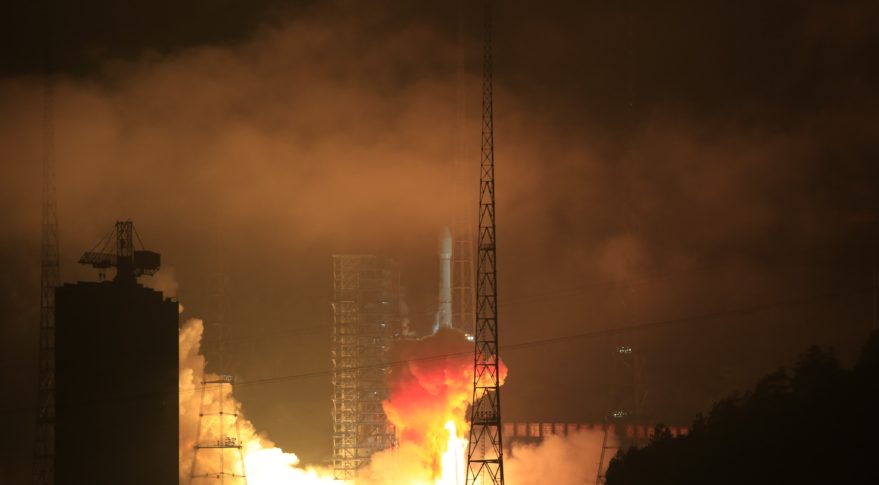On April 9th, a Long March-3B/G2 (Chang Zheng-3B/G2) rocket failed as it was attempting to launch a new Indonesian communications satellite into orbit.
The launch took place at the Xichang Satellite Launch Center, but reportedly failed during third stage flight.
The satellite, based on the Chinese DFH-4 platform, was to be used by PT Pasifik Satelit Nusantara (PSN) in cooperation with telecommunication service provider PT Indosat Ooredoo and PT Pintar Nusantara Sejahtera (PNS), to provide broadband internet access and high-quality broadcasting services.
The satellite, Palapa-N1 was to replace the current Palapa-D.
PSN, Indosat Ooredoo and PNS established a joint venture and contracted China Great Wall Industry Corporation (CGWIC), a subsidiary of China Aerospace Science and Technology Corporation to build the satellite.
Weighing 5,550 kilograms, Palapa-N1 had a capacity of 20×36 MHz C-band FSS transponders and 9.5 gigabit-per-second (Gbps) HTS. The satellite could have covered regions throughout the Asia Pacific and to Australia for C-band transponders and throughout Indonesia for HTS.
The satellite could have also been used for VSAT, broadcast, broadband, backbone, and backhaul services.
ℹ:https://t.co/7RpBEvodb5 pic.twitter.com/E5ulgpUzpN
— LaunchStuff (@LaunchStuff) April 9, 2020
To meet the demand of the international satellite launch market, especially for high power and heavy communications satellites, the development of Long March-3B (Chang Zheng-3B) launch vehicle was started in 1986 based on the fight proven technology of Long March launch vehicles.
Developed from the Chang Zheng-3A, the Chang Zheng-3B is at the moment the most powerful launch vehicle on the Chinese space launch fleet.
The rocket is capable of launching a 11,200 kg satellite to a low Earth orbit or a 5,100 kg cargo to a geosynchronous transfer orbit.
The CZ-3B/G2 (Enhanced Version) launch vehicle was developed from the CZ-3B with a lengthened first core stage and strap-on boosters, increasing the GTO capacity up to 5,500kg.
The first and second stages of the three-stage Long March 3B rocket appeared to perform well during the outset of the launch. But something went wrong with the third stage, raining debris back to Earth and destroying the Palapa-N1 satellite, Xinhua reported.
#UPDATE: #Guam Homeland and federal authorities monitoring reports of “unidentified object” seen falling from the sky @PostGuam pic.twitter.com/3u69abhNu4
— Nick Delgado (@Mr_NixNetwork) April 9, 2020
The failed Long March 3B launch marks China’s second launch failure in less than a month. On March 16, a Long March 7A rocket failed to launch a classified satellite into orbit during a debut test flight from the Wenchang Satellite Launch Center on China’s southern Hainan Island.
MORE ON THE TOPIC:





C’mon china,all the great innovation,power,wealth and technology and you can’t even achieve one sattelight,unlike musk who succesfully landed all 4,500 into orbit,according to his new york scientists?
Try again.
Useless chinks only good at creating pandemics and promoting their decadent materialism while avoiding to confront US imperialism.
Well China never had a good tech for bringing satellites into orbit and other stuff, the chinese are kinda lazy when it comes to making these rockets, and probably those final checks are not been monitored good, 2 satellites crashing in one month says a lot about Chinese space rockets systems. Means incapable or who knows what exactly going on, maybe they trying to cut in, with cheap shit means not adding quality parts into their rockets, means Profit. Communist regime government.So is this crashed satellite insured, usually they are insured if crash happens, I believe the chinese are owing a satellite now to the Indonesian people.
70 years ago China was a pre-industrial society, now they’re launching native satellites on native rockets. It pays to remember that people were making wisecracks and deriding Japanese products as inferior not that long ago.
All space agencies that launch rockets experience failures, the many American failures have been well documented, but for some people is just “tough luck” or some s$it like that, and when the Chinese or Russians fail it’s “typical” or some s$it like that (European Space Agency used to get that too). For some morons it’s just a football game.